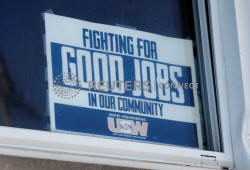In Michigan steel towns, tariffs meant to revive industry cost jobs
 Send a link to a friend
Send a link to a friend
 [September 26, 2019] By
Rajesh Kumar Singh [September 26, 2019] By
Rajesh Kumar Singh
ECORSE/RIVER ROUGE, Michigan (Reuters) - Some steelworkers who cheered
U.S. President Donald Trump's tariffs on foreign steel last year are now
being laid off, an unintended consequence of his America First policy as
United States Steel Corp <X.N> reacts to sagging demand from automakers
reeling from higher steel prices.
Steel prices rallied following the tariffs imposed in March, 2018,
feeding optimism in U.S. steel towns. But higher prices later hurt
demand from automakers already squeezed by slowing demand for
traditional gasoline-powered sedans.
Trump's tariffs still enjoy support in the Rust Belt communities that
helped elect him in 2016. But U.S. Steel's layoffs, first reported by
Reuters last month, demonstrate some of the risks he faces as he seeks
re-election in 2020.
Steel prices peaked in May 2018 and have retreated to pre-tariff levels
after American factories boosted production and demand weakened.

In June, U.S. Steel idled a blast furnace at the local Great Lakes Works
plant in the cities of Ecorse and River Rouge Michigan, an electoral
swing state. Two months later, the company decided to temporarily let go
of 48 of employees and warned of up to 200 more layoffs by the end of
September.
The Great Lakes plant, situated along the Detroit river, primarily
serves the automotive industry which is largely based in Michigan. Top
U.S. auto producer General Motors Co <GM.N> is closing production at
three assembly plants and last year said tariffs on imported steel cost
it $1 billion.
In the primary metal manufacturing industry in Wayne County, Michigan,
home of Great Lakes Works and "The Twin Steel Cities" of Ecorse and
River Rouge, employment in March was down 3.3 percent from a year
earlier.
City leaders said that without the tariffs, the situation could have
been worse, noting that as far back as 2002, the local plant was on the
verge of closing.
"Imported steel was killing us," said River Rouge Mayor Michael Bowdler,
who was laid off in 1981 from Great Lakes Works. "Something had to be
done," said Bowdler, a Democrat.
Last year, U.S. Steel restarted two blast furnaces and hired back about
800 workers at its Granite City plant in Illinois. Trump declared in
front of cheering workers that U.S. Steel was "back".
Since March 1, 2018, U.S. Steel's shares have plunged 76% on softening
steel prices and concerns about its debt-fueled investment program. The
Pittsburgh-based company's reliance on to the auto sector has
exacerbated the pain, and data compiled by Goldman Sachs shows U.S.
Steel's production costs are among the world's highest.
Last week, U.S. Steel warned that falling steel prices would make its
third-quarter loss steeper than expected. It said the blast furnace at
the Great Lakes Works plant will remain idled through at least the end
of the year.
It has proposed a $600 million investment to upgrade Great Lakes Works
and make it more efficient, a commitment local officials called
encouraging. But U.S. Steel wants a tax break from Ecorse and River
Rouge to carry out the investment, which will not create new jobs.
[to top of second column] |

A "Fighting For Good Jobs" sign is seen in the window of
Steelworkers Local 1299 union hall in Ecorse, Michigan, U.S.,
September 24, 2019. REUTERS/Rebecca Cook

It has negotiated a similar tax deal in Gary, Indiana.
DEMOCRATIC CONUNDRUM
News of temporary layoffs at Great Lakes Works spurred criticism of Trump's
trade policies from Democrats including presidential hopeful Beto O'Rourke and
Michigan Representative Rashida Tlaib.
But widespread support for tariffs from members of both parties in manufacturing
communities has made it difficult for Democratic candidates to campaign with a
distinctive message in swing states like Michigan, which Trump won by less than
11,000 votes in 2016.
A majority of manufacturing workers surveyed in a recent Reuters/Ipsos poll had
a favorable view of Trump's policies concerning them.
"We wouldn't have the demises of some of these industries, had we done this
30-40 years ago," said James Perry, executive director at the Downriver
Community Conference (DCC) which runs retraining programs for laid-off workers
in Southeast Michigan.
U.S. Steel is the largest employer in the two cities and among the biggest
sources of revenues.
The steelmaker accounts for a third of Ecorse's revenues. City officials are
also eyeing another $100,000 in new revenues from the company's proposed
investment at Great Lakes Works. That is a lifeline for the city of 9,600
residents, which until two years ago was battling a financial emergency and was
run by a state-appointed emergency manager.
The city of River Rouge, which was under Michigan's financial oversight for six
years, gets 60% of its revenues from U.S. Steel and DTE Energy. But the
Detroit-based energy company has announced to close its River Rogue plant in
2021.
In Ecorse, U.S. Steel runs internship and job shadowing programs for students
and pays for the city's annual fireworks.
In December 2008, the plant was shut for nine months, with more than 2,000
lay-offs that in turn hurt restaurants and retailers in River Rouge, aggravating
the city's fiscal crisis.

When the plant reopened, Bowdler said, excited residents came out in hordes to
watch thick clouds of white smoke billowing from its chimneys. Some city
officials had tears in their eyes, he said.
The latest layoffs are a blow to employees and families. A laid-off worker from
the Great Lakes works said the unemployment benefits of up to $362 a week were
not enough to pay her bills.
"You can't survive on that," Perry agreed.
(Reporting by Rajesh Kumar Singh; Editing by Caroline Stauffer and David
Gregorio)
[© 2019 Thomson Reuters. All rights
reserved.] Copyright 2019 Reuters. All rights reserved. This material may not be published,
broadcast, rewritten or redistributed.
Thompson Reuters is solely responsible for this content. |